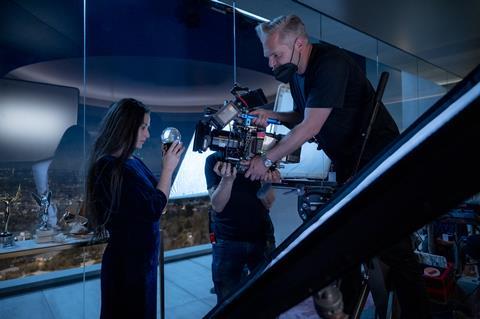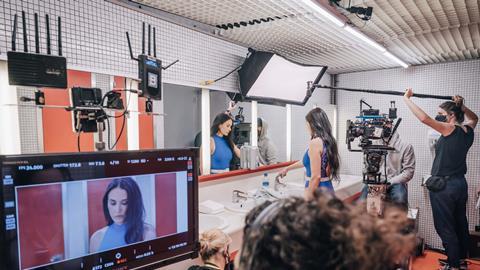Fortune favours the bold – and that’s certainly the case for Demi Moore, who is winning new fans with provocative body horror The Substance.
Demi Moore has changed. At age 62, she says proudly, “I’ve never been in this place before in my life, and so I want to just reflect it in the most honest, authentic way I can. In doing that, maybe it opens a pathway for others too.
“For a very long time,” she continues, “a woman’s value was tied to her fertility, and when we got past a certain age, somehow we were seen as not as desirable. The irony is, I feel so much more whole and complete within myself now than I ever have.”
Part of this new phase of her life includes starring in a jaw-dropping role different to any other in her storied 40-year career: in Coralie Fargeat’s bold, feminist fable/body horror The Substance. Moore plays Elisabeth Sparkle, a fitness show TV host who tries a radical antidote to ageing. By injecting “the substance”, she is reborn in a younger alter-ego, Sue (played by Margaret Qualley), but Elisabeth and Sue cannot exist at the same time, leading to a bloody showdown for survival.
Moore was a megastar herself in the 1980s and ’90s – she rose to become Hollywood’s highest-paid actress in 1995 – appearing in era-defining films such as St. Elmo’s Fire, A Few Good Men, Ghost, Indecent Proposal and G.I. Jane. Even when her career slowed down somewhat as she concentrated on family life, Moore still found time for interesting performances in Primetime Emmy Award-nominated miniseries If These Walls Could Talk, famously turning heads in a bikini at age 40 in Charlie’s Angels: Full Throttle, and going independent with JC Chandor’s feature debut Margin Call. She also directed a segment in cancer-themed short film anthology Five in 2011.
The Substance, a US-UK-France co-production led by Working Title, had its premiere in Cannes where it won the prize for best screenplay. The film went on to earn four nominations at the European Film Awards and five at the Golden Globes. Moore herself has nominations at the Globes and Independent Spirits, and tied for second place for lead performance at the Los Angeles Film Critics Association awards.
This all means the actress now finds herself with a serious chance of landing her first nominations at major film awards such as the Oscars and Baftas. And with more than $75m at the worldwide box office for distributor Mubi, The Substance represents her biggest cinema hit in more than two decades.
Personal histories

Moore fought to land the role in The Substance. When she got the script from her agent, she says, “I was fully captivated by the subject matter that it was delving in, and also the unique way that Coralie was looking to explore this. Obviously, this is a very personal story for her.”
French filmmaker Fargeat, who made her debut feature in 2017 with French-language thriller Revenge, has spoken about how the idea came to her as she was approaching 40 years old and pondering her place in society.
“As women,” Fargeat has said, “we are led to believe we have no choice but to be perfect/sexy/smiling/thin/young/beautiful to be valued in society.”
Moore had six meetings with Fargeat – who writes, directs and also serves as one of the film’s producers and editors – before she was hired. “After one of our many discussions about our relationships with our bodies, our relationships with ourselves, I knew if I gave her my memoir, she might have a different frame of reference to fully understand my experience,” recalls Moore, referring to her 2019 book Inside Out.
In the memoir, Moore writes about how she had struggled with her own bodily quest for perfection. In just one example, she recalls the time when she was shooting 1993’s Indecent Proposal, and felt such pressure to be thin that she would cycle 60 miles to the set each day, shoot long hours and then juggle breastfeeding her six-month-old baby.
“For me, my hardest time [in my career] was not about ageing, it was when I was younger,” says Moore. “There were moments that were a bit embarrassing and humiliating, like being told to lose weight, but it was nothing as bad as what I was doing to myself. It was the voice inside me.
“That for me is the more important message of this film, what other people do or don’t do is irrelevant,” she continues. “How we hold it is everything. In this film, I get this second chance in this new younger body and I repeat the same pattern, I seek the same validation. Sue could have said, ‘I’ve got a second chance to do my own thing.’”
One standout scene in The Substance sees Elisabeth prepare to go on a first date, and is about to walk out of the door looking fabulous when she catches a glimpse of Sue’s pert body on a billboard. Elisabeth immediately doubts herself, ripping off outfits and violently applying and reapplying her makeup, in such a state of turmoil she cannot leave the house.
Moore says that scene had a particular depth for her. “The part that resonated so much – and not just specific to women, but to all of us as people – is the way we can be so critical towards ourselves, self-judgmental, and violent in our own internal monologue. Not just physically, it could be, ‘I’m not smart enough.’ It felt like that could touch a deep place in people.”
The shoot that day was extreme: they did more than 15 takes, and would have done more but make-up artist Stéphanie Guillon refused to let Moore continue to damage her skin. “It was raw,” remembers Moore. “I think the make-up artist was stressed that day, perhaps more than I was. For me, it was just really opening myself up to go to such a raw, vulnerable place.”
Embracing isolation
They shot for nearly five months in Paris, and living away from her usual homes in the US (Beverly Hills, Idaho and New York) helped Moore tap into the character.
“I had so many plans to do things in Paris, but what we were doing every day was so intense emotionally and physically that I literally did nothing outside of the film,” she says. “I would just come home and be with my dog [her online-famous chihuahua Pilaf]. I was in a foreign country without my normal support system or the usual comforts; I could also bring that into my experience of Elisabeth – she’s a very isolated person, she doesn’t have friends, everything she’s invested in is her work and her identity.”
Even on set, Moore was quite often appearing solo, frequently looking into a mirror. “It was important that my internal conversation was alive with a thought all the time… It’s so different than having a conversation on screen.”
Moore had to keep rethinking her physicality as more prostheses covered parts of her body – whether one finger or half her face, or a hump on her back. “Some of that challenged my logical brain – I have a humpback and I’m completely degraded physically, but I can run like a bat out of hell,” she says with a laugh. “Margaret and I had to anchor into the emotional reality so Coralie could focus more on the extremes. We had to maintain the humanity so it doesn’t become a caricature.”
For the more extreme final scenes of the shoot, Moore could be in the make-up chair for up to 9.5 hours with at least another hour for removal. She would use that time to still herself or think about the character. It was also helpful just having that time to see her own reflection “inside” the creature at the end: “You’re still there, it’s still you.”
Moore sees The Substance as part of a new phase of her career. West Texas-set oil industry drama Landman – a series jointly created by Taylor Sheridan and Christian Wallace – has launched on Paramount+, and she will next shoot Boots Riley’s I Love Boosters for Neon.
She clearly holds different values for herself in this more mature phase of her career. “I can look back at the harshness I’ve had against myself in my twenties, thirties, forties and up. The difference today is not that those things don’t come up – I just hold it differently and don’t mark my value based on it.”
Moore long ago saw her three children with ex-husband Bruce Willis – Rumer, Scout and Tallulah – all enter adulthood. “It’s not my time of raising my kids,” she reflects. “So all of that energy that was going outward is now able to be reclaimed and brought back into myself, and I’m excited to see where things are going to go.”




















![[Clockwise]: 'Anora', 'The Substance', 'Kneecap', 'All We Imagine As Light'](https://d1nslcd7m2225b.cloudfront.net/Pictures/100x67/6/4/0/1439640_screenteamfilms_937759.jpg)





No comments yet